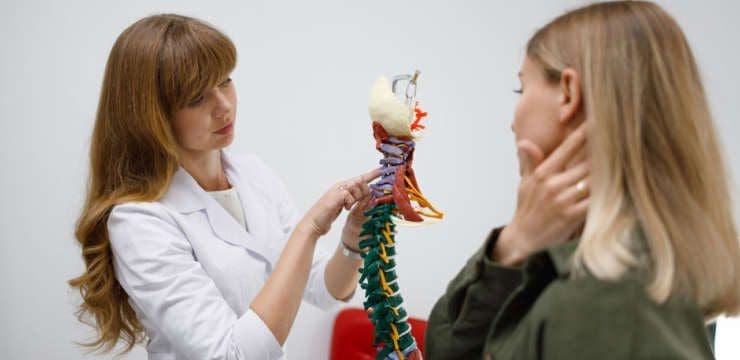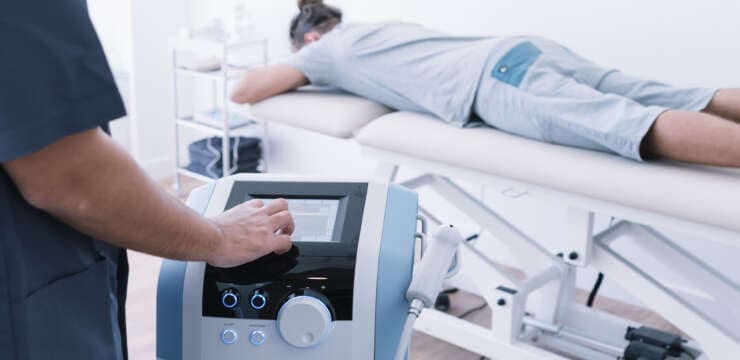
Table of Contents
Healing Nerve Damage Naturally After a Car Accident

A motor vehicle accident (MVA) can occur in an instant, but its impact on the body—especially the nervous system—can linger for months or even years. Many accident survivors experience unexplained numbness, tingling, or burning pain in their arms, legs, hands, or neck. These symptoms often point to nerve damage, a hidden but serious consequence of trauma.
While conventional care may focus on medications or short-term pain relief, patients who want lasting healing are turning to integrative approaches that combine functional nutrition, movement therapy, chiropractic care, and wellness coaching. These methods work together to restore nerve function, reduce inflammation, and support total body recovery.
At Health Coach Clinic, the focus is on empowering patients to take control of their healing through natural strategies backed by science and clinical results. By addressing the root cause—not just the symptoms—patients can reclaim their quality of life after injury.
Reference:
Bailey & Greer
Understanding the Types of Nerve Injuries from Auto Accidents
After a car accident, it’s common to feel sore or stiff. However, when those sensations evolve into burning pain, numbness, or weakness, it often signals a deeper issue—nerve injury. Knowing the type of nerve damage that has occurred is the first step in choosing the right path for recovery. At Health Coach Clinic, this understanding forms the foundation for a whole-body, integrative healing plan.
1. Peripheral Nerve Damage
Peripheral nerves are the ones that extend outside your brain and spinal cord—like the wiring that powers your arms, legs, and organs. These nerves are vulnerable during sudden impact, especially if the body is twisted or compressed during a crash. Damage can cause:
- Numbness or tingling in the limbs
- Muscle weakness or loss of coordination
- Burning or stabbing sensations
Peripheral neuropathy may develop if the nerves are pinched, bruised, or stretched, and can worsen over time if not addressed holistically (Marks & Harrison, n.d.).
2. Radiculopathy (Pinched Nerve Root)
Radiculopathy is a common outcome of spinal trauma. When a spinal disc is pushed out of place or inflamed, it can press on nerve roots in the neck or lower back. This creates sharp, radiating pain that travels from the spine into the arms or legs.
Symptoms include:
- Electric-like shooting pain
- Weakness or numbness in the extremities
- Increased pain when sitting, bending, or turning
Chiropractic adjustments and corrective posture therapy—two cornerstones of integrative care at Health Coach Clinic—can help relieve the pressure and restore proper nerve flow (Sally Morin Law, n.d.).
3. Whiplash-Associated Nerve Injury
Whiplash is more than just a sore neck. When the head is thrown forward and backward suddenly—like in a rear-end collision—it can strain spinal nerves, causing lingering symptoms such as:
- Neck stiffness
- Headaches that begin at the base of the skull
- Tingling or burning in the shoulders and arms
This form of nerve damage is often missed on X-rays, making advanced evaluation and functional movement testing critical parts of an integrative assessment (Mayo Clinic, n.d.).
4. Brachial Plexus Injuries
The brachial plexus is a network of nerves running from your neck to your shoulder and arm. In serious crashes, it can be stretched or torn, leading to:
- Arm weakness
- Loss of sensation
- Partial paralysis in the upper limb
This condition requires careful, progressive care—often involving a combination of physical therapy, neuromuscular reeducation, chiropractic support, and dietary strategies to support nerve regeneration (Mayo Clinic – Brachial Plexus).
5. Long-Term Nerve Injuries
Some injuries don’t fully appear until weeks later. Delayed-onset neuropathic symptoms, like burning, itching, or muscle atrophy, may be the result of inflammation, scarring, or improper healing. Integrative health coaching emphasizes early intervention, patient education, and long-term prevention to prevent these issues from becoming chronic.
At Health Coach Clinic, patients receive personalized education about the type of nerve damage they have and what their body needs to heal—physically, chemically, and emotionally.
References:
Marks & Harrison
Sally Morin Law
Mayo Clinic – Whiplash
Mayo Clinic – Brachial Plexus
Natural Signs and Symptoms of Post-Accident Nerve Damage
Recognizing the signs of nerve damage early can lead to faster recovery and prevent long-term complications. After a motor vehicle accident, many people dismiss symptoms like tingling or numbness as minor. However, these are often the body’s way of asking for help. At Health Coach Clinic, our integrative team pays close attention to these early signals and tailors care to treat the root causes—not just mask the pain.
Common Symptoms of Nerve Damage After a Car Accident
The symptoms of nerve injuries vary depending on which nerves were affected. Some are immediate. Others appear slowly as inflammation sets in or scar tissue forms. Below are the key symptoms to watch for:
1. Tingling and Numbness
This “pins and needles” feeling is often the first sign that nerves are compressed or irritated. It may come and go—or become constant over time. This is common in the hands, fingers, arms, feet, or legs, depending on the area of injury (BWG Law, n.d.).
2. Burning or Shooting Pain
Nerve pain is distinct from muscle pain. It may feel like:
- An electric jolt down the leg (sciatica)
- A burning line in the arms
- Sensitivity to touch, even from light fabric
These are signs of inflammation or entrapment along the nerve’s path (Zanes Law, n.d.).
3. Muscle Weakness or Atrophy
Motor nerves control muscle movement. If damaged, you might:
- Struggle to grip objects
- Have difficulty lifting your arms
- Notice shrinking muscle mass over time
This is why early therapy and functional movement retraining are vital to preserving strength.
4. Loss of Balance or Coordination
When nerves affecting the legs or feet are injured, it can affect your ability to walk, stand, or climb stairs. This may also be caused by proprioceptive dysfunction—the body’s loss of awareness of limb position, often due to spinal or nerve root injury.
5. Delayed-Onset Pain
Some people don’t experience symptoms until weeks after the accident. Swelling, scar tissue, or poor posture from compensating can lead to gradually worsening nerve symptoms. Integrative care helps catch these issues early through functional assessments, posture analysis, and wellness check-ins (Keeton Law Firm, 2025).
Integrative Symptom Tracking and Assessment
At Health Coach Clinic, every patient undergoes a 360° functional evaluation that looks at:
- Range of motion
- Muscle strength
- Nerve response and reflexes
- Posture and movement habits
- Sleep, stress, and nutrition—factors that impact nerve repair
We also encourage clients to keep a journal of their symptoms, which helps identify patterns and triggers that may interfere with their healing. Whether symptoms are acute or subtle, we build an action plan that combines lifestyle medicine, manual therapy, and coaching to relieve nerve tension and rebuild the body from the inside out.
References:
BWG Law
Zanes Law
Keeton Law Firm
How Health Coaching and Chiropractic Care Work Together for Nerve Recovery
At Health Coach Clinic, healing is never one-size-fits-all. Especially when it comes to nerve damage after a car accident, our team uses an integrative approach that combines personalized health coaching with evidence-based chiropractic care. This powerful partnership helps address the physical, nutritional, emotional, and lifestyle factors that influence nerve healing.
Chiropractic Care: Restoring Alignment and Reducing Nerve Pressure
When the body experiences a sudden jolt, such as during a car crash, the spine can become misaligned. These misalignments (also called subluxations) can pinch or irritate nearby nerves, causing pain, tingling, and inflammation. Chiropractors are trained to detect and correct these issues using:
- Spinal adjustments to relieve pressure on nerve roots
- Soft tissue therapy to relax muscles that compress nerves
- Postural retraining to improve alignment and prevent further damage
- Spinal decompression to treat disc bulges that affect nerves
Regular chiropractic care helps restore communication between the brain and body, creating the ideal conditions for nerve recovery (Mayo Clinic, n.d.).
Health Coaching: Supporting the Body from the Inside Out
While chiropractic focuses on the spine and nervous system, health coaching adopts a comprehensive approach to overall well-being. Nerves require oxygen, nutrients, hydration, and low inflammation to function well. After an accident, poor habits or stress can delay this healing process.
Our certified health coaches help clients:
- Design anti-inflammatory meal plans with omega-3s, antioxidants, magnesium, and B vitamins
- Create stress-reduction routines (breathwork, meditation, nature walks)
- Improve sleep hygiene to aid nighttime nerve regeneration
- Build sustainable movement routines to restore balance and reduce compensation patterns
This approach empowers patients to make lifestyle choices that support long-term nerve health, rather than just providing symptom relief.
The Synergy of Dual-Therapy Care
When chiropractic care and health coaching are combined, results improve dramatically. Clients not only feel better—they heal faster and more completely.
Benefits include:
- Less inflammation and swelling around nerves
- Faster improvement in strength and mobility
- Reduced reliance on pain medications
- Enhanced energy and emotional resilience
- A deeper understanding of how to stay well post-recovery
Real-Life Example: A Holistic Recovery Story
After being rear-ended at a stoplight, Maria, a 37-year-old schoolteacher, developed neck stiffness, numbness in her fingers, and low back pain, X-rays showed no broken bones, but her symptoms worsened.
At Health Coach Clinic, she received:
- Weekly spinal adjustments to relieve cervical radiculopathy
- Personalized nutrition coaching to reduce systemic inflammation
- At-home stretches to keep nerves gliding freely
- Supportive coaching to manage anxiety related to driving again
Within 10 weeks, Maria returned to her classroom with more energy, better sleep, and no nerve symptoms. Her story is one of many showing the power of integrative care.
Reference:
Mayo Clinic – Whiplash
Acupuncture, Supplements, and Functional Medicine in Nerve Recovery
Healing from nerve damage after a car accident requires more than spinal adjustments and rest. At Health Coach Clinic, we recognize that functional medicine, acupuncture, and targeted supplementation are essential components in supporting nerve regeneration, reducing chronic inflammation, and restoring total body balance.
These tools complement our chiropractic and coaching services, offering clients a deeply personalized approach to post-accident recovery.
Acupuncture: Rebalancing the Nervous System
Acupuncture is an ancient practice backed by modern research. By inserting thin, sterile needles into specific points along the body’s energy pathways (meridians), acupuncture stimulates circulation, reduces inflammation, and promotes the release of natural pain-relieving chemicals like endorphins and serotonin.
For nerve injuries caused by car accidents, acupuncture can help:
- Reduce nerve hypersensitivity and burning sensations
- Improve blood flow to damaged tissues
- Support calmness and relaxation, easing anxiety related to chronic pain
- Promote nerve repair and communication through consistent sessions
Patients with sciatica, cervical radiculopathy, and brachial plexus injuries often report significant symptom relief after integrative acupuncture treatments (Baltimore Peripheral Nerve Pain Center, n.d.).
Nutritional Supplements That Support Nerve Healing
The nervous system relies on specific vitamins, minerals, and antioxidants to function properly and recover from injury. Functional medicine offers a science-backed supplement plan tailored to each patient’s needs.
Key supplements used at Health Coach Clinic include:
- Vitamin B-complex (especially B1, B6, and B12) to support nerve cell regeneration
- Alpha-lipoic acid (ALA) to combat oxidative stress and improve nerve conduction
- Magnesium can reduce nerve-related muscle spasms and improve sleep
- Curcumin (from turmeric) for its powerful anti-inflammatory effects
- Omega-3 fatty acids to enhance nerve repair and protect the brain
Our functional medicine team provides lab testing when needed to identify nutrient deficiencies or inflammatory markers that may be slowing recovery.
Gut-Nerve Connection: The Functional Medicine Perspective
The gut and nervous system are closely connected. After a traumatic injury, stress and medication use (especially NSAIDs or opioids) can disrupt gut health. This imbalance affects not only digestion but also neurotransmitter production and immune function, both of which are essential to nerve healing.
Through stool testing, food sensitivity analysis, and gut-focused care plans, we help clients:
- Reduce intestinal inflammation
- Restore microbiome balance
- Improve nutrient absorption for better healing outcomes
By treating the gut-brain axis, we support the nervous system at its root.
Customized Functional Medicine Plans
Every person heals differently. That’s why we build custom protocols that may include:
- Detox support for inflammation and metabolic waste
- Methylation support (via folate, B12, and SAMe) for cellular repair
- Herbal adaptogens (like ashwagandha or rhodiola) to regulate stress hormones
- Sleep support protocols for improved nighttime regeneration
When combined with chiropractic adjustments and health coaching, functional medicine becomes a powerful tool for healing from the inside out.
References:
Baltimore Peripheral Nerve Pain Center
Mind-Body Techniques and Emotional Healing After a Car Crash
Nerve injuries don’t just affect the body—they can also have a profound impact on the mind. After a motor vehicle accident, many people experience lingering anxiety, disrupted sleep, or even post-traumatic stress symptoms. At Health Coach Clinic, we recognize that true healing encompasses both emotional recovery and physical repair.
Integrative nerve healing encompasses strategies that calm the nervous system, foster emotional resilience, and mitigate stress-driven inflammation. These approaches are rooted in both science and compassion.
The Impact of Stress on Nerve Recovery
Chronic stress stimulates the body’s “fight-or-flight” system, releasing cortisol and adrenaline. While these hormones are helpful in emergencies, prolonged activation can delay nerve healing, weaken the immune system, and exacerbate pain.
High stress levels can also:
- Make nerve pain feel more intense
- Interfere with sleep, when most healing happens
- Disrupt digestion, affecting nutrient absorption
- Lead to muscle tension that compresses nerves further
This is why calming the mind is just as important as adjusting the spine.
Mind-Body Therapies That Support Nerve Healing
At Health Coach Clinic, we introduce clients to mind-body techniques that restore balance to the autonomic nervous system, shifting it from “fight-or-flight” to “rest-and-digest.”
1. Breathwork and Diaphragmatic Breathing
Slow, intentional breathing stimulates the vagus nerve, which in turn lowers blood pressure and reduces nerve inflammation.
2. Guided Meditation and Visualization
Mindfulness meditation lowers pain perception and helps patients process emotional trauma. Visualization can also help alleviate the fear of movement after an injury.
3. Progressive Muscle Relaxation
This technique teaches the body to release tension one muscle group at a time. It’s especially useful for patients dealing with upper body tension from whiplash.
4. Heart Rate Variability (HRV) Training
Using tools like wearable monitors, patients can track and improve their stress resilience over time, which is an excellent biofeedback tool during recovery.
Coaching for Emotional Support
Recovering from a crash is a journey, physically and emotionally. Many patients feel lost or frustrated when symptoms linger or their lifestyle is disrupted. Our integrative health coaches offer emotional support by:
- Helping patients set realistic healing goals
- Providing accountability and encouragement
- Identifying stress triggers and offering personalized coping tools
- Supporting social reintegration (e.g., returning to work, driving again)
- Referring out to trauma therapists if needed
This whole-person care model ensures that no part of the healing process is ignored.
Creating a Healing Environment
Beyond individual therapies, we help clients transform their environments into places that support calm and healing. This may include:
- Using natural light to regulate circadian rhythms
- Eliminating processed foods that trigger inflammation
- Creating wind-down routines that promote restorative sleep
- Designing ergonomically sound workspaces to reduce nerve strain
By aligning the external world with internal healing, patients find their recovery is faster, more complete, and more empowering.
Reference:
McGowan, Hood & Felder, 2025
Long-Term Maintenance and Lifestyle Habits for Nerve Health
Healing from nerve injuries sustained in a car accident doesn’t stop when the pain fades. At Health Coach Clinic, we emphasize ongoing maintenance and healthy lifestyle habits to support long-term nerve health, prevent future injury, and ensure that the nervous system stays balanced and resilient.
Without proper care, the effects of nerve damage can resurface months or even years after the initial injury. That’s why it’s essential to stay proactive about your recovery.
Daily Habits That Support Nerve Regeneration
Long-term nerve healing is a slow process, but your daily choices can help accelerate it. Here are lifestyle habits that nourish the nervous system:
1. Eat for Nerve Function
A nerve-supportive diet includes:
- Leafy greens, sweet potatoes, berries, and avocados
- Wild-caught fish and flaxseeds for omega-3s
- Whole grains for B vitamins
- Anti-inflammatory spices like turmeric and ginger
Avoiding sugar, processed foods, and artificial additives can reduce inflammation and oxidative stress, which are major contributors to nerve pain (Keeton Law Firm, 2025).
2. Stay Hydrated
Water is essential for nerve conduction. Dehydration can increase nerve sensitivity and muscle cramping. Aim for half your body weight in ounces of water daily, more if you’re physically active or in a dry climate.
3. Move Daily—But Mindfully
Movement keeps nerves flexible and muscles strong, which prevents compression and stiffness. Integrative rehab includes:
- Gentle stretching and nerve gliding exercises
- Low-impact strength training
- Mindful movement like yoga or Tai Chi
- Postural alignment routines to reduce mechanical stress
Our health coaches guide clients through safe movement progressions based on their recovery stage and functional goals.
The Role of Chiropractic in Ongoing Wellness
Even after the acute phase of recovery, chiropractic care continues to offer vital support by:
- Correcting small misalignments before they cause big problems
- Reducing pressure on spinal nerve roots
- Preventing compensation injuries from unaddressed posture habits
- Supporting the nervous system’s communication pathways
Regular chiropractic checkups can serve as a “tune-up” for the spine and nervous system, especially important for individuals with a history of whiplash, sciatica, or spinal trauma (Eckell Sparks, 2024).
Nervous System Resilience: Training for the Long Term
To keep the nervous system healthy, you need to build resilience—your body’s ability to bounce back from stress, injury, or daily strain. Here’s how:
- Prioritize deep, consistent sleep
- Use cold showers or contrast hydrotherapy to boost circulation and nerve stimulation.
- Practice HRV biofeedback to enhance stress adaptability
- Spend time in natural environments, which help regulate the nervous system
- Avoid environmental toxins (e.g., heavy metals, pesticides) that impair nerve function
Wellness Coaching for Sustainable Success
Our integrative health coaches provide tools, accountability, and encouragement to help you maintain these habits even after the recovery phase. Whether it’s meal planning, mindset support, or movement coaching, we walk alongside you to help make healthy choices feel natural and rewarding.
Because when nerve healing becomes part of your lifestyle—not just your treatment plan—the results last a lifetime.
References:
Keeton Law Firm
Eckell Sparks
Final Thoughts—Whole-Person Recovery After Nerve Injury
Recovering from nerve damage after a car accident is more than just healing a physical injury—it’s about rebuilding your life. At Health Coach Clinic, we believe in the body’s remarkable ability to heal when given the right tools, time, and support. That’s why we focus on whole-person care—an integrative system that treats not just the nerve, but the entire human behind it.
The Road to Recovery Is Not Linear—And That’s Okay
Every healing journey is unique. Some patients experience improvement in a few weeks, while others may take several months to regain their strength and sensation. The key is to stay committed, stay informed, and stay supported.
With our comprehensive approach, recovery includes:
- Physical realignment through chiropractic care
- Nutritional and functional support with supplements and lifestyle changes
- Mind-body techniques to manage stress and regulate the nervous system
- Emotional guidance and habit-building through personalized coaching
- Collaboration with acupuncturists and functional medicine specialists to uncover and treat hidden causes
When all parts of care work together, healing becomes faster, deeper, and more sustainable.
Empowerment Through Education and Self-Care
You don’t have to be a doctor to understand your body—you need the right guidance. One of our core goals at Health Coach Clinic is to teach clients how to listen to their bodies, recognize when something is off, and take action to address it.
Whether it’s adjusting your posture, choosing an anti-inflammatory meal, or using breathwork to calm nerve pain, you become the driver of your recovery, not a passive passenger.
This empowerment builds confidence, promotes independence, and ultimately helps prevent future injuries.
We’re With You Every Step of the Way
At Health Coach Clinic, you’re never just a file or a case number. You’re a person with goals, fears, and the capacity to heal. Our team comprises chiropractic doctors, integrative health coaches, and functional practitioners who collaborate to help you restore balance, alleviate pain, and live life to the fullest again.
We celebrate every small win, from your first pain-free walk around the block to the moment you sleep through the night without nerve pain, because we know those milestones mean everything.
Take the Next Step
If you’re experiencing numbness, tingling, burning pain, or other symptoms after a car accident, don’t wait. Early intervention leads to better outcomes. Please schedule a consultation with Health Coach Clinic today and let us create a personalized care plan tailored to your recovery needs.
You’ve been through enough. Let’s get you back to health—naturally, holistically, and completely.
Reference List:
- Bailey & Greer
- Sally Morin Law
- Marks & Harrison
- Mayo Clinic – Whiplash
- Mayo Clinic – Brachial Plexus
- BWG Law
- Zanes Law
- Keeton Law Firm
- Eckell Sparks
- Baltimore Peripheral Nerve Pain Center
- McGowan, Hood & Felder
Disclaimers
Professional Scope of Practice *
The information herein on "Integrative Nerve Injury Recovery After Motor Accidents" is not intended to replace a one-on-one relationship with a qualified health care professional or licensed physician and is not medical advice. We encourage you to make healthcare decisions based on your research and partnership with a qualified healthcare professional.
Blog Information & Scope Discussions
Welcome to El Paso's wellness blog, where Dr. Alex Jimenez, DC, FNP-C, a board-certified Family Practice Nurse Practitioner (FNP-C) and Chiropractor (DC), presents insights on how our team is dedicated to holistic healing and personalized care. Our practice aligns with evidence-based treatment protocols inspired by integrative medicine principles, similar to those found on dralexjimenez.com, focusing on restoring health naturally for patients of all ages.
Our areas of chiropractic practice include Wellness & Nutrition, Chronic Pain, Personal Injury, Auto Accident Care, Work Injuries, Back Injury, Low Back Pain, Neck Pain, Migraine Headaches, Sports Injuries, Severe Sciatica, Scoliosis, Complex Herniated Discs, Fibromyalgia, Chronic Pain, Complex Injuries, Stress Management, Functional Medicine Treatments, and in-scope care protocols.
Our information scope is limited to chiropractic, musculoskeletal, physical medicine, wellness, contributing etiological viscerosomatic disturbances within clinical presentations, associated somato-visceral reflex clinical dynamics, subluxation complexes, sensitive health issues, and functional medicine articles, topics, and discussions.
We provide and present clinical collaboration with specialists from various disciplines. Each specialist is governed by their professional scope of practice and their jurisdiction of licensure. We use functional health & wellness protocols to treat and support care for the injuries or disorders of the musculoskeletal system.
Our videos, posts, topics, subjects, and insights cover clinical matters, issues, and topics that relate to and directly or indirectly support our clinical scope of practice.*
Our office has reasonably attempted to provide supportive citations and has identified the relevant research studies or studies supporting our posts. We provide copies of supporting research studies available to regulatory boards and the public upon request.
We understand that we cover matters that require an additional explanation of how they may assist in a particular care plan or treatment protocol; therefore, to discuss the subject matter above further, please feel free to ask Dr. Alex Jimenez, DC, APRN, FNP-BC, or contact us at 915-850-0900.
We are here to help you and your family.
Blessings
Dr. Alex Jimenez DC, MSACP, APRN, FNP-BC*, CCST, IFMCP, CFMP, ATN
email: coach@elpasofunctionalmedicine.com
Licensed as a Doctor of Chiropractic (DC) in Texas & New Mexico*
Texas DC License # TX5807
New Mexico DC License # NM-DC2182
Licensed as a Registered Nurse (RN*) in Texas & Multistate
Texas RN License # 1191402
ANCC FNP-BC: Board Certified Nurse Practitioner*
Compact Status: Multi-State License: Authorized to Practice in 40 States*
Graduate with Honors: ICHS: MSN-FNP (Family Nurse Practitioner Program)
Degree Granted. Master's in Family Practice MSN Diploma (Cum Laude)
Dr. Alex Jimenez, DC, APRN, FNP-BC*, CFMP, IFMCP, ATN, CCST
My Digital Business Card






